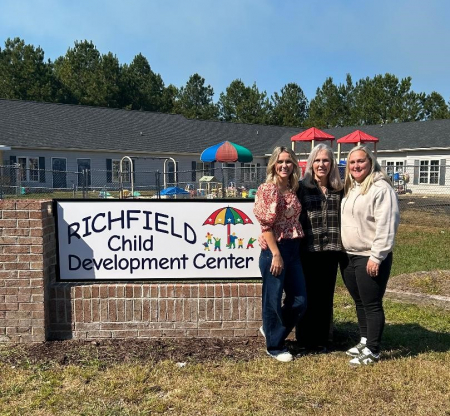<<< Back to October 2024 Newsletter
 |
KELLEY HUFF Kelley Huff is the Owner and Director of Richfield Child Development Center in Stanly County. Richfield CDC sponsors its own ECE apprenticeship program, where currently one-third of staff are apprentices. Kelley joined the DPI-sponsored pre-apprenticeship and recently had her first pre-apprentice graduate high school and into an ECE apprenticeship! |
Tell us about your career in early education and how you came to Richfield Child Development Center.
I am the Owner/Director of Richfield Child Development Center. The facility opened on August 12, 1996, originally licensed for 60 children but now has over 275 children enrolled. I was a stay-at-home mom for 12 years prior to opening the facility, and I credit my time as a stay at home mom as the foundation and spark that encouraged me to open Richfield CDC. I have an Associate degree in Business and an Associate degree in Early Childhood. When the facility opened, my children, Katie and Jenna, were ages seven and two, so both have grown up as students and now serve as Co-Directors. Katie graduated from Pfeiffer University with an MBA in 2014 and Jenna, a Bachelor's degree in Communications from Appalachian State University.
Describe your journey with implementing an apprenticeship program at Richfield CDC. What are the benefits you have seen so far as a result?
With the apprenticeship program, we’ve been able to create opportunities for existing staff to continue education and/or continue their education in Early Childhood Development. The apprenticeship has also been a recruiting and retention tool when it comes to staffing, we have over ⅓ of our staff enrolled in the program. With the program funding for items such as laptops and transportation costs, this eliminates any potential barriers that could exist. The apprenticeship program has paved the way for staff to support their professional growth and improve the quality of our program.
Earlier this year, you also had a pre-apprentice who was enrolled in a high school ECE course and working part-time at Richfield CDC. Describe how pre-apprenticeship worked for your program. How did it benefit your pre-apprentice?
The pre-apprenticeship program served as a critical bridge between classroom learning and hands-on experience. The pre-apprentice was able to apply knowledge learned in the ECE course and apply it in a real-world setting. This benefited the pre-apprentice by enhancing their practical skills, boost confidence and fostering personal relationships. They gained valuable insights into classroom management, child development, and team collaboration, which are essential in early childhood education. Additionally, this experience positioned them well for future apprenticeship opportunities, providing a clearer path towards a successful career in the field. In fact, our pre-apprentice continued into the apprenticeship program at Richfield Child Development Center and is working towards her degree.
How has Building Bright Futures enabled you to support your early childhood apprentices and pre-apprentice?
Building Bright Futures has significantly enhanced our ability to support early childhood apprentices and pre-apprentices by providing structured resources and a strong network. The program offers training programs, mentorship opportunities, and professional development that equip apprentices with essential skills and knowledge. It has helped strengthen our workforce and enhance the quality of care and education provided to children.
What do you think is the strongest piece of the early childhood apprenticeship program?
The strongest piece of an early childhood apprenticeship program is the combination of hands-on experience and mentorship. This approach allows apprentices to apply knowledge in real-world settings while receiving guidance from experienced professionals. This dual focus not only accelerates skill development but also fosters confidence and a deeper understanding of child development and classroom dynamics.
What do you want readers to know about the early childhood workforce?
I want readers to understand that the early childhood workforce is crucial for shaping the foundational development of children. These professionals are not only educators but caregivers who foster social, emotional, and cognitive growth. Despite their essential role, the workforce often faces challenges such as low wages, high turnover rates, and limited resources. Investing in early childhood education and supporting these professionals through training, mentorship, and better compensation is vital for improving outcomes for children and families. Recognizing the value of early childhood educators is key to building a stronger, more effective education system that benefits society.